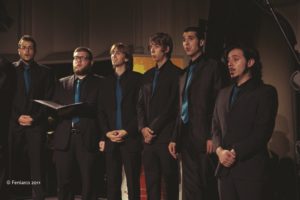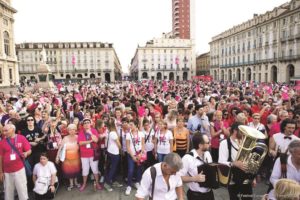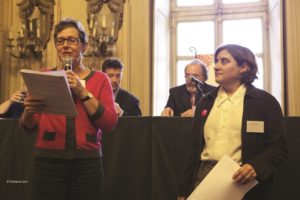XVIII Europa Cantat Festival, Turin (Italy) 2012
Giorgio Morandi
journalist & singer
From 27th July to 5th August, the outstanding choral festival Europa Cantat took place in the splendid city of Turin, Italy, following three years of work by a large team at FENIARCO/ECA (Italian National Federation of Regional Choral Associations and the European Choral Association). It saw the participation of groups and solo artists from forty-two countries in four continents. The final press release by the European Choral Association-Europa Cantat contains figures which give an idea of the dimensions of this festival:
“When the curtain of the festival falls, some amazing figures emerge. During these ten days, Turin and Piedmont welcomed more than four thousand participants (singers, directors, and composers.) And to this we must add the impressive number of 871 guest artists, including vocal groups, instrumentalists and dancers. We must also remember 131 workshop instructors as well as 322 volunteers (an incredibly valuable resource), 150 members of international organising staff, twenty-four young aspiring artistic events managers, and thirteen professional sound technicians. The one hundred and eleven programmed concerts were received with great enthusiasm, as the online bookings and the queues at the ticket office windows showed. Every evening the seats at the numerous concert venues were sold out. Every evening in Piazza San Carlo alone, between 2500 and 3000 people gathered. The number of participants in the music study activities was also impressive: forty-one workshops of varying duration and forty-seven Discovery Workshops of one or two days were attended by enthusiastic participants. The Music Expo Project, devoted to musical publishing, featured twenty-five national and international editors. Over fifty officially accredited journalists from all round the world attended the festival. As well as those already mentioned, many other people were involved in various ways in this event which brought together a hundred and twenty-five choirs, twenty-five guest artist groups, ten national or regional youth choirs, and a vast number of individual participants, amateurs and spectators of all ages and from all nations.”
It has to be said, the event was an immense success, even greater than the organisers could have imagined. And, unbelievable but true, the rain gods contributed significantly to the success of the festival. Just to be sure they wouldn’t miss it, they waited until the last day (what timing, and what a storm!), joining in just two hours before the closing ceremony. Fortunately, the many arcades of this splendid city ensured that the rain did not ruin either the visit to Turin undertaken by so many people, or the huge task successfully carried out by the organisers and their collaborators.
This triennial European choral event has now taken place eighteen times, but this was the first time in its long history that it was held in Italy. The event is, and will long remain, an indication of the international vitality of choral music, and also of the enormous development of Italian choral music and choral associations in Italy in the past fifteen years. This is confirmed not only by the organisational ability shown by the Italians, but by the great number of Italian choirs and singers present (approximately thirty per cent of the participants) and the quality of their performances. It must be noted that the participants of the Europa Cantat festival were predominantly young people, which explains why the event was listed and recommended in the Torino Città Giovane project, organised by the city of Turin with the aim of creating a system of events to highlight the commitments carried out over recent years on behalf of young people. The atmosphere, certainly more musical than in any other major event hosted by the people of Turin in the past three years, was not the only thing that was different. Even the colour of the city changed: magenta, the official colour of the festival, was the dominant colour for ten days, seen everywhere in thousands of posters, flyers, totems, and banners, and in the t-shirts worn by the volunteers assisting the organisers.

Much is owed to the immense, tireless work of all the staff and volunteers who were knowledgably trained, supported and directed by Sante Fornasier, President of both Feniarco and the European Choral Association – Europa Cantat. After taking part in the festival, one choir master wrote:
“… I was able to attend the Study Tour for choir masters and the final presentation of the workshop on Monteverdi’s choral music, as well as workshops and concerts held in every part of the city … This is an enjoyable and important experience for choir masters and choristers, worth bearing in mind even when it takes place abroad.”
This impromptu statement suggests an introduction, which because of lack of space will have to be brief, to some of the main activities and some of the most important aspects of the Turin festival.
Is it possible to combine hundreds of cultures in one single choir? Certainly, and this was demonstrated by one of the most popular daily activities of the festival. In the hearts of both the participants and the population of Turin, the Open Singing event-within-the-event will certainly be treasured and remembered as a magical moment. Every evening in Piazza San Carlo, thousands of people met under the precise and friendly direction of Michael Gohl, with the support of the Accademia Feniarco choir and of famous guest conductors. In this enchanted setting, thousands of people sang hundreds of songs from a repertoire taken from many different countries and ranging from classical to traditional to modern. To mark the occasion, each participant received a copy of the useful and attractive Songbook which served both as a guide for the music performed and a memento of the festival.
There were so many workshops that it is impossible to list them all, but mention must be made of at least one. The title ‘Choir, Love at First Sight’ really does suggest a captivating programme. The word ‘love’ which appears in the title is highly significant: certainly, it alludes to the love of music, but this is closely connected to the affection we feel for our families and loved ones. It is notable that participation in this workshop was very popular among the wives, husbands and relatives of singers who were already members of choirs. All these people wanted to discover the origin of their loved ones’ passion for choral singing. The workshop gave them the gratification of listening to and enjoying their own voices, highlighting how the body, beginning with correct breathing and posture, plays a fundamental role in singing. Rhythm, intonation and the basics of reading music were the other aspects welcomed with great enthusiasm and enjoyment by the participants. The success of this workshop is vouched for by Rilke, a participant and my colleague (as a translator) on the editorial staff of the Festival’s daily newspaper ReadyTONews. This paper also deserves a mention, but suffice it to say that it was the best daily paper of a choral event that you have ever seen – just take the word of a (dis)interested … member of the editorial staff.
The Turin festival, just like the preceding ones, showed that in the world of music, Monteverdi, Vivaldi, Bach and Handel are all stars who will never go out fashion. Despite appearances to the contrary, classical music still attracts the most attention from the public. This was shown by the numbers of people who each evening, despite the fact that the tickets were sold out, gathered at the doors of the church of San Filippo, willing to spend the evening standing in order to enjoy a great concert.

However, this interest in classical music has done nothing to diminish interest in music written and created for the people (popular or pop music) or coming from the people (folk music). These genres were also well represented at the festival in all their diversity of origin, from the United States to the Baltic, from Spain to Finland, not to mention the hybrid forms of African rhythms transplanted to Latin America. Mediterranean folk music was especially well represented, a variegated musical patchwork from Occitania, Majorca, Dalmatia, southern Italy, Tunisia and North Africa. It is safe to say that the Europa Cantat festival in Turin really was (as incontrovertibly shown by the workshop for female voices entitled ‘Let’s Travel’ directed by Basilio Astulez) a world tour of choral music. Nothing was missing from this festival, not even experimental music, for instance the fusion of choral singing and electronic music. Professor Stefano Bassanese of the University of Turin explained the thinking behind this, in an interview in ReadyTOnews:
“We may not realise it, but electronics is at the root of many of our daily interactions with music: not only when we listen to a CD, an MP3, or an LP, or when we use a digital keyboard, but also in various other situations, for example when amplification is used in an open space … it allows us to modify the sound of a voice in real time …”
There is no doubt about it: electronics and electro-acoustics have changed and are continuing to change the way in which we think about music, the way we listen to it, play it and compose it. The choral world could not and cannot ignore this fact.
To conclude our brief and incomplete account of the festival, we should like to mention all those who collaborated with ECA-Europa Cantat and FENIARCO to make the eighteenth Europa Cantat Festival in Turin possible: the ACP (association of Piedmontese choirs), the Piedmont regional administration, the Province and the Municipality of Turin, and the collaboration of the Compagnia di San Paolo foundation and of the Chamber of Commerce.
ECA-EC General Assembly (three pictures)
But the closing words of this report must be left to the two leading men of the festival. The first is Carlo Pavese, Artistic Director of the Turin festival, and he is very happy with the outcome:
“Europa Cantat is a unique festival, which brought to the city of Turin five thousand voices singing together with passion and great musical worth, and leaving an unforgettable memory. And I am convinced that the city reserved a special and lasting welcome for this event. The venues, the buildings, and above all the inhabitants of Turin were a part of this huge choir which, each evening, turned Piazza San Carlo into a symbol of harmony and beauty.”
At the closing ceremony of the festival, before passing the baton to the authorities of Pécs (Hungary) who will host the nineteenth Festival in 2015, Sante Fornasier, President of the European Choral Association-Europa Cantat and of FENIARCO gave the following speech:
“We have come to the end of this extraordinary ten-day journey. Together we have all been joyful and active protagonists in this beautiful city which has welcomed us generously and offered us its artistic beauties and the many beautiful locations in which we have been able to listen to and create our songs, our music … We have also been welcomed by the whole Piedmont region where twenty-five concerts have taken place, embracing all the provinces. We have celebrated this festival by nourishing our souls. We will carry the thrill of the festival back to our own countries, and we will long preserve it in our hearts to feed our noble, true, and very special passion.”
Translated from the Italian by Alison Hayward, UK
Edited by Gillian Forlivesi Heywood, Italy






